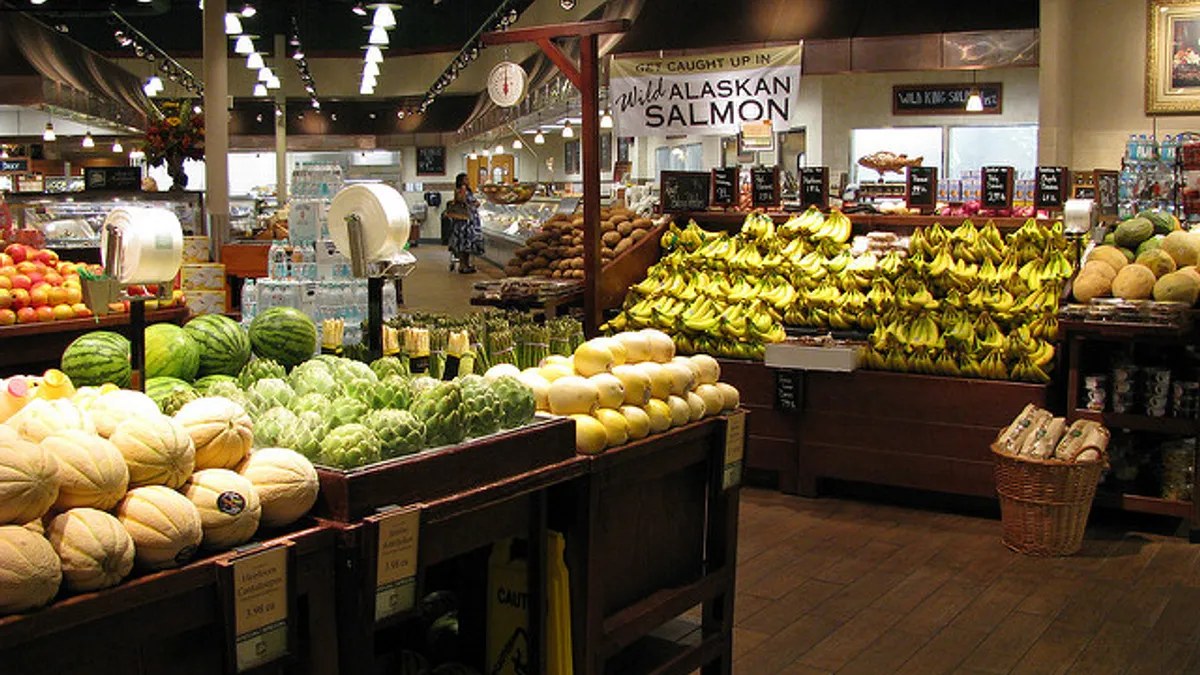Dive Brief:
- The Fresh Market opened its first, and only, new store for 2018 last week in Charlotte, near its home base of Greensboro, North Carolina. The newer iteration of The Fresh Market concept will be located just yards away from a previous store that opened in 1991, reported The Charlotte Observer.
- The high-end grocery chain decided to slow its expansion and close 15 underperforming stores across the country this year in an effort to improve its finances.
- Under new CEO Larry Appel, The Fresh Market wants to focus on its roots as a European specialty market in order to differentiate itself in the crowded Charlotte market, swarming with competitors such as Whole Foods, Sprouts, Earth Fare and other high-end grocers. So instead of an all-purpose store, The Fresh Market wants to be viewed as a destination for international and gourmet foods, paired with prepared foods and a new product assortment.
Dive Insight:
Originally, The Fresh Market had 12 stores in development for 2018, but stiff competition in the high-end grocery sector has steered a new course centered on improving selection, in-store features and lowering prices, according to Planned Grocery data published in Winsight Grocery.
This shift isn't the first for The Fresh Market in recent years. In 2016, after the company was taken private by Apollo Capital Management, the store format was revamped. It seems, however, the latest changes are due in large part to the new leadership under Appel, who had a clear vision when he joined the team a little over a year ago. No stranger to retail or the grocery industry, his resume includes 10 years with Winn-Dixie.
As part of his plan, Appel wanted to bring back the specialty aspects of The Fresh Market — the little touches that made it unique from any other supermarket. And he wasted no time implementing his turnaround plan, which included the closure of underperforming stores.
Beyond cutting out stores that were not working, Appel knew that specialty stores that have a close community connection often fare well, even in a crowded urban space. With this in mind, he focused his efforts on opening one revamped store near the brand's home base, in order to keep a close eye on progress. Like the company's recent remodels, the new location will include an expanded center store selection, household and baby products and more locally sourced and healthy foods.
Will all this be enough to compete with Whole Foods? It could be a struggle. In the past, The Fresh Market had difficulties going up against mainstream grocers like Kroger and Walmart who could offer organic products for less. And it's not offering the discounts of German competitor Lidl. With Whole Foods, in particular, The Fresh Market does not have the size or scope outside of the North Carolina market that the Amazon-backed grocer has gathered.
However, what the new location does have going for it is the lush North Carolina agricultural roots. Consumers have proven that they are willing to pay more for locally sourced products, and North Carolina is home to a growing network of small farmers.
The grocer also can still focus on unique products not found on the shelves of Whole Foods. Maren Trocki, director of grocery and dairy at The Fresh Market, told a crowd at this summer's Fancy Food Show that Amazon is forcing the 176-unit chain to be more creative.
"We're going to be really unique and really different and have items people are really going to want to taste and smell and know how to use," Trocki said.
In order to beat out Amazon, brands like The Fresh Market are focusing on quality, not quantity. So between fresh, local meats and produce, combined with unique product offerings, the specialty retailer stands a fighting chance, even in the crowded grocery market.












